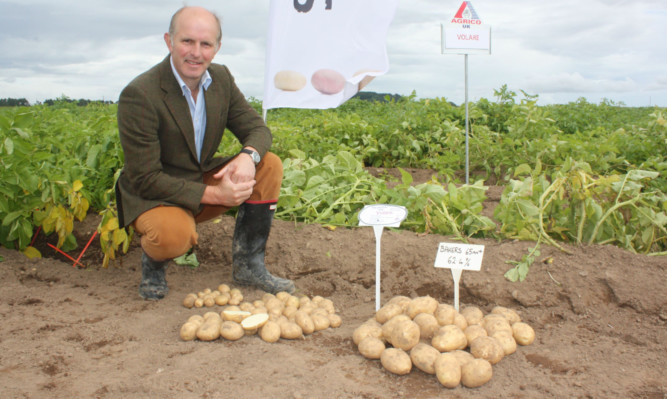Seed potato company Agrico UK is heavily involved in cutting-edge research and trials work which, if successful, could see two of the greatest scourges in the industry called to heel.
The bacterial disease blackleg has been an ongoing problem for decades, as has infestation with the pallida species of potato cyst eelworm.
Speaking at a growers’ day at Ladenford, Forfar, courtesy of Lour Farms, Agrico executive director Archie Gibson pointed to work funded by the Agritechnology Strategy Board along with his own company, potato specialists McCains and Branston and Dundee-based Advanced Pest Solutions.
The intention is to develop a bacteriophage product which could be applied either to seed potatoes before planting, to the soil, or in combination with blight sprays. The target would be the blackleg bacteria.
Bacteriophages are viruses which multiply within the bacteria, effectively killing it before it can do damage.
“We know the bacteriophage technology works against blackleg because it is already used in packhouses to treat potatoes.
“With every customer complaint costing £25 to address, there is clearly an incentive to stop tubers breaking down with soft rot in the pre-pack,” said Mr Gibson.
“We don’t know which method of field treatment will be most effective, but at the moment SASA (Science and Advice for Scottish Agriculture) are doing trials in pots.
“It could be that a seed dip is most effective, or it could be a blight spray mix.
“Agrico are hoping to be able to carry out field trials with different strengths of mix.”
As regards PCN work, Agrico are in year four of trials in East Lothian overseen by Scottish Agronomy’s Eric Anderson.
The pallida species of PCN has over the years proven to be far more resilient than the rostochiensis variant.
It is 40 years since Maris Piper and other varieties resistant to rostochiensis appeared, but pallida resistance has so far proven to be elusive.
Tolerant varieties, principally Cara, have been commonly grown but they simply withstand pallida infestation reasonably well rather than controlling it.
Indeed the population of PCN will typically soar after growing a tolerant variety, storing up problems for the future.
By contrast, growing a truly resistant variety will result in a dramatic decrease in surviving PCN cysts.
Agrico now have two pallida-resistant varieties, and these were on show at Ladenford.
Performer is billed as suitable for chipping, baking and processing.
Arsenal is suitable for crisping and processing.
Mr Gibson is, however, keen to use these pallida-resistant varieties and others like them as a way of bringing infested land back into seed production and slow down or stop the loss of good seed-growing land.
“I would like to see a debate started over the possibility of allowing seed crops of pallida-resistant varieties to be grown on infested land.
“The resulting crop would only be used for producing a ware crop and not for further multiplication of seed. It would help reduce viable cyst populations and keep seed land in production,” he said.
It would, he acknowledged, require a change of regulations at Scottish and EU level, but in his view the benefits would make the effort worthwhile.
Agrico has also started in-store trials at its Castleton of Eassie store using an ozone generator to change the atmosphere.
“We are trying it in an ambient store and a cold store and comparing survival of bacteria on the tubers with an untreated store.
“The higher ozone level seems to neutralise bacteria and prevent them doing their worst.
“My initial impression is that it works” he said.
The Potato Council’s Sutton Bridge unit was monitoring the trials.
